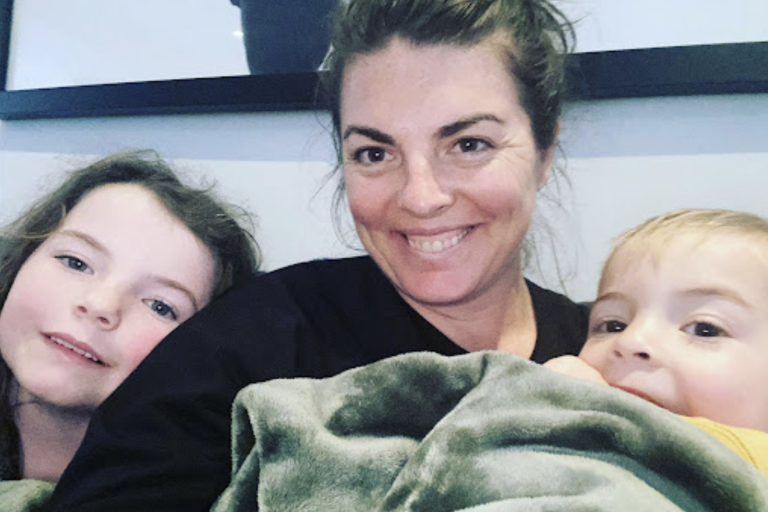How to Parent Through Miscarriage

By Samantha Payne, CEO and Co-Founder Pink Elephants
When the world shatters, but the school bell still rings, that’s the bizarre, heartbreaking reality of experiencing pregnancy loss when you already have children. One in four pregnancies ends in miscarriage, a statistic that feels abstract until it’s your body, your baby and your grief. And then, there’s the added layer: how do you explain the unexplainable to little eyes that still look to you for everything? How do you not feel like a punch to your stomach when your three-year-old points to your tummy and says ‘baby’.
With my last loss in 2020, my children were three and seven years old. When writing this article, I looked back and a profound fresh wave of grief hit me. You see this was a protracted, drawn-out loss. At an early dating scan, no heartbeat was detected, and I then endured an agonising two-week wait until I could have another scan. During those two weeks I still had to parent and function. I honestly don’t know how I did that. Then there was a heartbeat, sweet relief. Then a few days later I started to bleed and we lost this loved and wanted baby. I have blocked so much of this out as it was survival only mode at that time. I hope now by writing this piece I can help another parent in this experience feel seen, validated and supported.

My own experience with miscarriage, while my living children still needed school lunches packed and bedtime stories read, was a masterclass in emotional whiplash. One moment, I was hunched over, silently weeping, the next, I was summoning a smile to ask about their day. It felt like living a double life, one steeped in profound sorrow, the other meticulously curated to maintain a semblance of normalcy for them. The physical pain of miscarriage is immense, but the emotional pain, compounded by the need to parent, is a unique kind of agony. The losses for me were magnified; it was like parenting brought home the true reality of what I was losing at that very moment.
Talking to Little Ones About Big Loss
One of the hardest parts was knowing how to talk to my kids. How do you explain a baby who was, and then suddenly isn’t? For toddlers, simple, concrete language is key. We talked about how “the baby was too little to grow big and strong,” and that “the baby’s heart stopped beating.” For my daughter, who was school-aged, I was a bit more open, explaining that sometimes, sadly, pregnancies don’t continue. The key was to be honest without being overwhelming.
What I wish I’d had was more guidance on the language. There’s no script for this. I fumbled through, often wishing someone had given me a few helpful phrases. Importantly, we always emphasised that it wasn’t anyone’s fault, especially not theirs. It was hard for them to see their mummy so sad, sometimes there were no words, just quiet cuddles on the couch.
The Uncomfortable Dance of Grief and Joy
Parenting through pregnancy loss is a constant, exhausting dance between grief and joy. One minute, I was engulfed in sadness, a heavy blanket of sorrow. The next, my child would tell a hilarious joke, or achieve a small victory, and a surge of pure joy would break through. It felt almost disloyal to feel happy, yet it was also essential for my own sanity and for my children’s well-being. Learning to make space for both emotions was crucial. It’s okay to cry, and it’s okay to laugh, sometimes within minutes of each other. This tension, this push and pull, is a very real part of the healing process. It’s also an important lesson for our children to witness: that even in sadness, joy can exist.

Naming the Unseen Loss
Even if your child never met the baby, naming the loss is incredibly important. It validates the experience for you, and for them. We chose a name for our baby, Evie. It acknowledged her existence, however brief, and allowed us to grieve a tangible loss. Kids are surprisingly intuitive and pick up on unspoken anxieties and silences. By openly acknowledging what happened, even if it was just to say, “we were very sad that the baby didn’t get to come and live with us,” we created an environment where it was okay to feel sad and to talk about it.
How Kids Process Parental Grief
Children respond to parental grief in varied ways. Some become clingy, others act out, and some become unusually quiet. My kids had their moments of confusion and sadness, mirroring my own emotions. They might ask, “are you still sad about the baby?” even weeks later. It’s a reminder that their memories are long, and they process grief over time, just like adults. It’s important to be patient with their questions and their shifting emotions. My children, in their innocent way, reminded me to slow down and acknowledge my feelings, even when I desperately wanted to hide them. One evening, my eldest, seeing my tears, simply climbed into my lap and held me. In that moment, their comfort was my greatest solace.
Supporting Grieving Parents
So, what can others do to support a grieving parent? Often, it’s the small, practical gestures that make the biggest difference. Instead of saying, “let me know if you need anything” offer something more concrete and suggest picking up the kids from school, dropping off a meal, or helping in another simple, tangible way. Most importantly, acknowledge their loss. If they’ve shared their baby’s name, use it. Understand that their grief is complex and ongoing.
The statistics are stark: 74% of women say miscarriage negatively affected their mental health, yet only 3% received psychological support. There’s no national miscarriage care protocol in Australia, which means parents are often left to navigate this challenging time without adequate professional guidance. This is where community support becomes vital.
From the Pink Elephants community, I’ve heard countless stories of isolation and misunderstanding. Parents often feel they need to “get over it” quickly for the sake of their living children, or that their grief isn’t valid because their baby wasn’t born. Shifting the silence and taboo around miscarriage in parenting spaces starts with us. It starts with open conversations, acknowledging the profound impact of these losses, and offering genuine, sustained support to those walking through the darkness.
By sharing our stories, we can slowly, but surely, chip away at the isolation surrounding pregnancy loss. We can create spaces where parents feel seen, heard, and supported, not just for their children, but for themselves and their own heartbreaking journeys. Whether you’re walking through this loss yourself or supporting another parent who is, what small step can you take today to help break the silence?
If you’re navigating this right now please know that you’re not alone. Our ‘Telling the kids’ resource can help guide you through those difficult conversations.
 About Samantha Payne
About Samantha Payne
Samantha Payne is the CEO and Co-Founder of Pink Elephants, using her own experience of early pregnancy loss to drive national change in how Australia understands and responds to miscarriage.
About Pink Elephants
Pink Elephants is Australia’s leading voice on early pregnancy loss, providing evidence-based peer support and national advocacy to ensure no one grieves miscarriage alone. Founded by women with lived experience, the organisation supports thousands of individuals each year through tailored resources, online communities, and a trauma-informed helpline.
Pink Elephants is also driving systemic change — reframing early pregnancy loss as a public health issue and advocating for compassionate, evidence-led responses across healthcare, workplaces, and policy. Its landmark Leave for Loss campaign has seen paid bereavement leave for miscarriage adopted by some of Australia’s largest employers, setting a new national standard for workplace care.
Through public storytelling, research, and cross-sector collaboration, Pink Elephants is working to break the silence around miscarriage and ensure grief is met with dignity, not dismissal.













